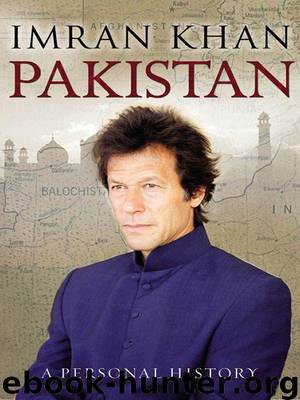Pakistan by Khan Imran

Author:Khan, Imran [Khan, Imran]
Language: eng
Format: mobi
ISBN: 9781446438244
Publisher: Random House UK
Published: 2011-09-14T16:00:00+00:00
Chapter Seven
The General, 1999–2001
AFTER MUSHARRAF HAD come to power in a military coup in 1999, many of us in Pakistan hoped he might bring a new lease of life to our country, following years of unstable and corrupt civilian governments. Nawaz Sharif’s plans to award himself dictatorial powers under the 15th Amendment were a genuine threat to any hope of establishing a proper democracy in Pakistan. Thank God we are saved, I thought at the time, as Musharraf promised to hold fresh elections, introduce genuine democracy and clean up corruption. Initially sincerity oozed out of him.
Yet even at my first encounter with him, in a secret meeting a few months after the coup, the alarm bells should have rung. I should have realized then and there that the general had no vision and no understanding of the importance of the rule of law. He had already issued his first Provisional Constitutional Order (PCO) and thrown a few judges out but he had left two of the most corrupt judges in place. So I took the opportunity to ask him why he hadn’t cleaned up the judiciary properly: surely, I said, if his main concern was good governance and curbing corruption this was the first thing he had to do because only a strong, independent judicial system can act as a check and balance on an executive. All of the worst instances of corruption in developing countries come from politicians having too much power. The reason they get away with it is because the judiciary is always subservient to the executive, or is in fact an extension of the executive. ‘Imran,’ Musharraf said, ‘if we touch the judiciary we’ll become pariahs for the international community.’ Of course he’d already done this himself; as it was, he should have worried about fixing Pakistan first, and then worried about the rest of the world. If the people of Pakistan had been behind him, he could have handled the world. As he was to find out seven years later, when he did remove the chief justice, even the backing of the world’s only superpower could not keep him in power when the people of Pakistan turned against him. The same thing happened to the Shah of Iran (and more recently Hosni Mubarak in Egypt and Zine El Abidine Ben Ali in Tunisia); when the Iranian people turned against him there was nothing the Americans could do to save him.
At first, many of us overlooked Musharraf’s early errors, thinking he was being badly advised, or that he did not understand politics. And we had been so disillusioned by the corrupt governments of Nawaz Sharif and Benazir Bhutto that had ruled Pakistan for the previous eleven years that we were full of hope. In the end, though, it became apparent that his only vision was how to keep himself in power. Every compromise he made was to strengthen his own position. Just as an earlier dictator, General Zia ul-Haq, had seized on the Soviet invasion of
Download
This site does not store any files on its server. We only index and link to content provided by other sites. Please contact the content providers to delete copyright contents if any and email us, we'll remove relevant links or contents immediately.
| Military | Political |
| Presidents & Heads of State | Religious |
| Rich & Famous | Royalty |
| Social Activists |
Waking Up in Heaven: A True Story of Brokenness, Heaven, and Life Again by McVea Crystal & Tresniowski Alex(37774)
Empire of the Sikhs by Patwant Singh(23064)
We're Going to Need More Wine by Gabrielle Union(19027)
Hans Sturm: A Soldier's Odyssey on the Eastern Front by Gordon Williamson(18559)
Leonardo da Vinci by Walter Isaacson(13299)
The Radium Girls by Kate Moore(12007)
Tools of Titans by Timothy Ferriss(8356)
Educated by Tara Westover(8040)
How to Be a Bawse: A Guide to Conquering Life by Lilly Singh(7464)
Permanent Record by Edward Snowden(5821)
The Last Black Unicorn by Tiffany Haddish(5621)
The Rise and Fall of Senator Joe McCarthy by James Cross Giblin(5264)
Promise Me, Dad by Joe Biden(5135)
The Wind in My Hair by Masih Alinejad(5082)
A Higher Loyalty: Truth, Lies, and Leadership by James Comey(4942)
The Crown by Robert Lacey(4794)
The Iron Duke by The Iron Duke(4341)
Joan of Arc by Mary Gordon(4085)
Stalin by Stephen Kotkin(3949)
